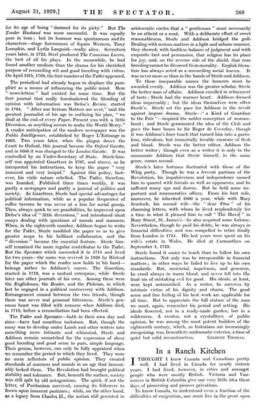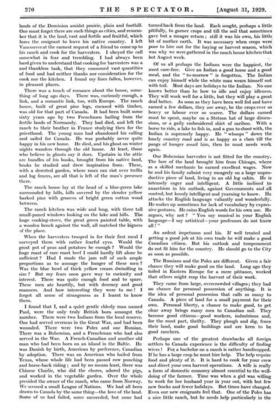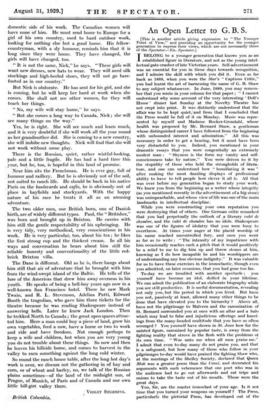In a Ranch Kitchen
ITHOUGHT I knew Canada and Canadians pretty well. I had lived in Canada for nearly sixteen .years. I had lived, however, in cities and amongst people who were mostly British. Victoria and Van- couver in British Columbia give one very little idea these days of pioneering and pioneer privations.
To know Canada, to understand even a fraction of the difficulties of emigration, one must live in the great open lands of the Dominion amidst prairie, plain and foothill. One must forget there are such things as cities, and remem- ber that it is the land, vast and fertile and fruitful, which lures the emigrant to leave his native country. I left Vancouver at the earnest request of a friend to come up to his ranch and cook for the harvesters. I obeyed the call somewhat in fear and trembling. I had always been hard given to understand that cooking for harvesters was a and thankless task, that they consumed vast quantities of food and had neither thanks nor consideration for the cook nor the kitchen. I found my lines fallen, however, in pleasant places.
There was a touch of romance about the house, some- thing of long ago days. There was, curiously enough, a link, and a romantic link, too, with Europe. The ranch house, built of great pine logs, encased with timber, was old for that part of Canada. It had been built some sixty years ago by two Frenchmen hailing from the fertile lands of Normandy. They had died, and left the ranch to their brother in France studying then for the priesthood. The young man had abandoned his calling and sailed for Canada. He was probably never quite happy in his new home. He died, and his ghost on winter nights wanders through the old house. At least, those who believe in ghosts say it does. Upstairs in the attic are bundles of his books, brought from his native land, books he studied and drew inspiration from. These, with a deserted garden, where reses ran riot over trellis and log fences, are all that is left of the man's presence there.
The ranch house lay at the head of a blue-green lake surrounded by hills, hills covered by the slender yellow barked pine with grooves of bright green cotton wood between.
The ranch kitchen was wide and long, with three tall small-paned windows looking on the lake and hills. The huge cooking-stove, the great green painted table, with a wooden bench against the wall, all matched the bigness of the place. - When the harvesters trooped in for their first meal I surveyed them with rather fearful eyes. Would the great pot of peas and potatoes be enough ? Would the huge roast of rare roast beef I could hardly lift alone be sufficient ? Had I made the jam roll of such ample proportions as to assuage the hunger of these men ? Was the blue bowl of thick yellow cream dwindling in size ? But my fears soon gave way to curiosity and interest. There was quite enough food and to spare. These men ate heartily, but with decency and good manners. And how interesting they were to me ! I forgot all sense of strangeness as I learnt to know them.
I found that I, and a quiet gentle elderly man named Paul, were the only. truly British born amongst the 'number. There were two Indians from the local reserve. One had served overseas in the Great War, and had been wounded. There were two Poles and one Russian. There was a Bohemian, and a Frenchman who had also served in the War. A French-Canadian and another old man who had been born on an island in the Baltic. He was Danish by birth, American by preference, Canadian by adoption. There was an American who hailed from Texas, whose whole life had been passed cow punching and horse-back riding ; and by no means least, there was Chinese Charlie, who did the chores, adored the pigs, and worked in the vegetable garden. Over the whole presided the owner of the ranch, who came from Norway. We seemed a small League of Nations. We had all been drawn-to Canada by -the same thing—the love of the land. -Some of us 'had failed, some succeeded, but none had turned back from the land. Each sought, perhaps a little pitifully, to garner crops and till the soil that sometimes gave but a meagre return ; still it was his own, his little bit of mother earth. It was necessary when crops were poor to hire out for the haying or harvest season, which ' was why we were gathered in the ranch house kitchen that hot August week. .
Of us all perhaps the Indians were the happiest, the most care-free. Give an Indian a good horse and a good meal, and the " to-morrow " is forgotten. The Indian can enjoy himself while the white man wears himself out with toil. Most days are holidays to the Indian. No one knows better than he how to idle and enjoy idleness; They will work well for a little, but they will play a great deal better. As soon as they have been well fed and have earned a few dollars, they are away, be the crops ever so heavy or labour ever so scarce. The dollars earned must be spent, maybe on a Stetson hat of large dimen- sions, or a gaily embroidered shirt of cariboo. With a horse to ride, a lake to fish in, and a gun to shoot with, the Indian is supremely happy. He " whoops " down the lonely country road and is as happy as a clam till the pangs of hunger assail him, then he• must needs work again.
• Our Bohemian harvester is not fitted for the country,: The lure of the land brought him from Chicago, where as a skilled mechanic he earned excellent wages. Now he and his family subsist very meagrely on a large unpro- ductive piece of land, living in an old log cabin. He is intensely eager and intelligent. A little inclined p anarchism in his outlook, against Governments and All control, but keenly intelligent and yearning to know. He 'attacks the English language valiantly and wonderfully. He makes up sometimes for lack of vocabulary by expres- sive gestures. He coins English words for his own use. He argues, why not ? "You say musical in your English language—I say artistical-your professors do not- knew all ! "
An ardent impetuous soul his. If well treated and getting a good job at his own trade he will make a good Canadian citizen. But his outlook and temperament do not fit him for the country. He should go to the City as soon as possible.
The Russians and the Poles are different. Given a fair chance they_ will make good on the land. Long ago they toiled in Eastern Europe for a mere pittance, worked that others might reap the harvest of their work.
They came from large, overcrowded villages; they had .no chance for personal possession of anything. It is the idea of personal possession that calls so many to -Canada. A piece of land for a small payment for their own. Personal liberty, a chance to make good, to get clear away brings many men to Canadian soil. They become good citizens—good workers, industrious and, for the most part, thrifty. They plough and dig, fence their land, make good buildings and are keen to be good ranchers.
Perhaps one of the greatest drawbacks all foreign settlers to Canada experience is the difficulty of finding wives ! For a bachelor on a ranch is rather handicapped. If he has a large crop he must hire help. The help require food and plenty of it. It is hard to cook for your crew and direct your own harvest operations. A wife is really a form of domestic economy almost essential to the well- doing of the farmer. Time was when a girl was willing to work for her husband year in year out, with but few new frocks and fewer holidays. But times have changed. Even our new emigrants feel that. One of the Poles has a nice little ranch, but he needs help- particularly in- the domestic side of his work. The Canadian women will have none of him. He must send home to Europe for a girl of his own country, used to hard outdoor work, looking for nothing else but a good home. His fellow- countryman, with a sly humour, reminds him that it is long since they were home. They have changed, the girls will have changed, too.
"It is not the same, Nick," he says. "These girls will want new dresses, new hats to wear. They will need silk stockings and high-heeled shoes, they will not go bare- footed as in our country."
But Nick is obdurate. He has sent for his girl, and she is coming, but he will keep her hard at work when she comes. She shall not see other women, for they will teach her things.
"No, my wife will stay home," he says.
"But she comes a long way to Canada, Nick; she will see many things on the way."
Yes, he is right. She will see much and learn much, and it is very doubtful if she will work all the year round as her grandmother did. She is coming to a new country, she will imbibe new thoughts. Nick will find that she will not work without some play.
There is the Russian, quiet, rather wistful-looking, pale and a little fragile. He has had a hard time this year, but he, too, is hopeful in this land of promise.
Near him sits the Frenchman. He is ever gay, full of humour and raillery. But he is obviously not of the soil, not suited to ranch life. He should be back in his native Paris on the boulevards and cafes, he is obviously out of place in hayfields and stackyards. With the happy nature of his race he treats it all as an amusing adventure.
The two older men, one British born, one of Danish birth, are of widely different types. Paul, the "Britisher," was born and brought up in Brixton. He carries with him still the gentle respectability of his upbringing. He is very tidy, very methodical, very conscientious in his work. He is very particular, too, about his tea ; he likes the first strong cup and the thickest cream. In all his ways and conversation he bears about him still the reliable honesty and conventionality of the little red- brick Brixton villa.
• The Dane is different. Old as he is, there hangs about him still that air of adventure that he brought with him from the wind-swept island of the Baltic. He tells of the lure of the Americas that drew him away overseas in his youth. He speaks of being a bell-boy years ago now in a well-known San Francisco hotel. There he saw Mark Twain, and R. L. Stevenson, Adelina Patti, Edward Booth the tragedian, who gave him three tickets for the theatre because he was reading Shakespeare instead of -answering bells. Later he knew Jack London. Then he trekked North to Canada ; the great open spaces attrac- ted him. Here a man could buy a piece of land, grow his own vegetables, feed a cow, have a horse or two to work and ride and have freedom. Not enough perhaps to keep a wife and children, but when you are very young you do not trouble about these things. So now and then he leaves his hillside home, and comes to harvest in the valley to earn something against the long cold winter.
So round the ranch house table, after the long hot day's work is over, we discuss not the gathering in of hay and corn, or of wheat and barley, no, we talk of the Russian plains sometimes—of the land of the midnight sun, of Prague, of Munich, of Paris and of Canada and our own little hill-girt valley there.
British Columbia.
VIOLET STUBBINS.


































 Previous page
Previous page